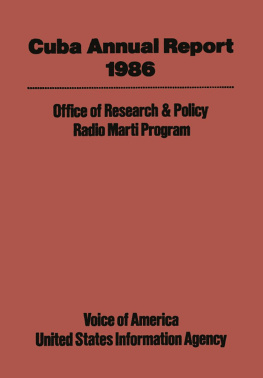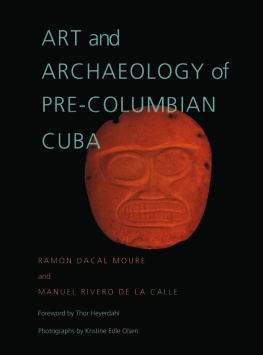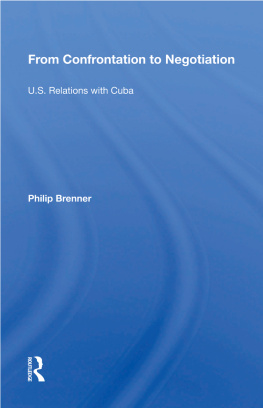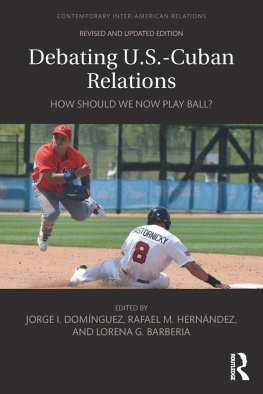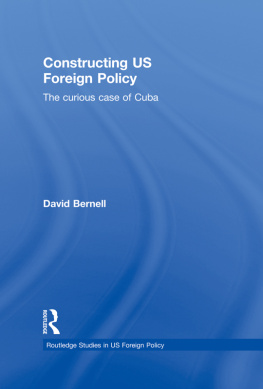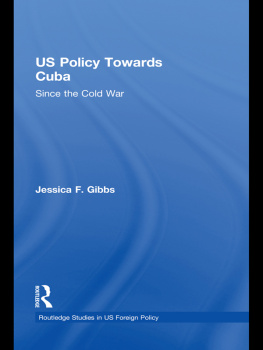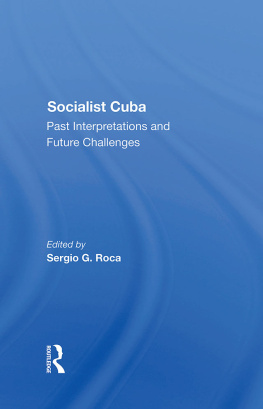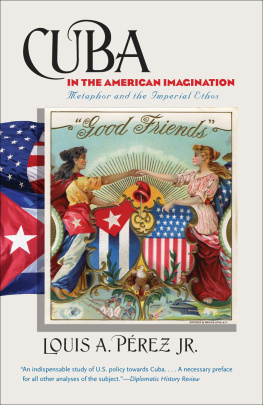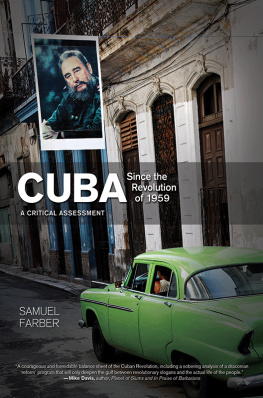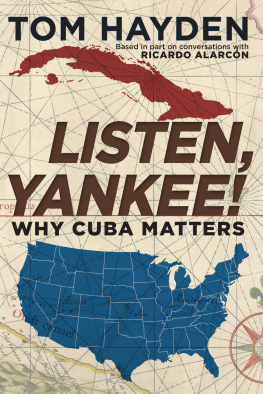First published 1990 by Transaction Publishers
Published 2019 by Routledge
2 Park Square, Milton Park, Abingdon, Oxon OX14 4RN
52 Vanderbilt Avenue, New York, NY 10017
First issued in paperback 2019
Routledge is an imprint of the Taylor & Francis Group, an informa business
Copyright 1990 by Taylor & Francis
All rights reserved. No part of this book may be reprinted or reproduced or utilised in any form or by any electronic, mechanical, or other means, now known or hereafter invented, including photocopying and recording, or in any information storage or retrieval system, without permission in writing from the publishers.
Notice:
Product or corporate names may be trademarks or registered trademarks, and are used only for identification and explanation without intent to infringe.
ISBN 13: 978-1-138-50877-4 (pbk)
ISBN 13: 978-0-88738-191-1 (hbk)
ISSN 0893-7494
FIRST QUARTER, 1986
During the first quarter Cuba entered the five-year period delineated by the Third Congress of the Cuban Communist Party. At these sessions, personalities and issues are subject to scrutiny and evaluation, the accomplishments and failures of the past five years arc reviewed, and the goals for the coming five years are set.
Perhaps the most central issue at the Third Party Congress was Fidel Castros role in the revolution. If anything, the Third Party Congress showed that Cuba is still under charismatic leadership and that the process of institutionalization is subjugated to Castros will. At times, the delegates acted as spectators to events beyond their control and not as the integral policy makers that they are supposed to be. The expressions, on some of their faces, like Guillermo Garca, Jess Montan and Ramiro Valds, revealed the stress of being forced to accept public dismissal by the Cuban leader.
Regardless of this assertion of charismatic leadership, the personnel changes reinforce the impression that the stage is being set for Ral Castro to play a larger role in overall government administration. The addition of Vilma Espn and Div. Gen. Abelardo Colom to the Politburo and the departure of Ramiro Valds tilted the line-up in favor of the Raulistas. Apparently the time has not yet come, if indeed it ever will, for Castro to relinquish the reins of power. The big build-up of Ral Castro when he was nominated as Second Secretary by Castro at the closing session contrasted sharply with Rals obvious irritation at the chaos Castro brought to the proceedings. In this respect, it is significant that Castros closing speech was never carried in Cubas printed media.
It will be interesting to observe the changes Castro makes this year in the regimes leadership and to notice how many new faces he introduces. The notion that any changes will respond to the replacement of revolutionary incompetents by technocrats cannot be substantiated at this time. Antonio Prez Herrero and Humberto Prez could fill the technocratic label better than their replacements. Future changes may indicate whether loyalty to Castro, instead of technical competence, will continue to be the main criterion for positions of power within the regime.
The intention to add younger people, women, and blacks to the Central Committee has provided only cosmetic changes that do not hold up under close scrutiny. As the Appendices 2, 3, and 4 show, the average age of the current Central Committee is older than that of the previous one (52.2 years versus 46 years). Although the number of blacks increased by six, there was a decrease of twenty-five mulattos and an increase of seventeen whites. Regarding women, only one was added to the permanent Central Committee. It will be interesting to watch if further changes are made following Castros rhetoric at the Third Party Congress.
The key issue right now is foreign policy. With unchallenged control of the Party, the government and the military/security establishment, Castro can continue using Cuba as a springboard for his international role. Internationalism will continue to be the centerpiece of national policy. Anti-Americanism is the basic postulate of Cuban foreign policy, with Soviet dependency as its corollary.
It is no wonder, then, that soon after the Third Party Congress Castro traveled to the Soviet Union to attend the USSR Party Congress and meet Mikhail Gorbachev for the first time. Castros speech reflected Cubas ties with and, to a degree, subservience to the Soviet Union: We believe in Lenins great motherland, we believe in the Soviet people, their glorious party, its leadership, and in you, Comrade Gorbachev. But in spite of Castros public pronouncements, serious points of divergence can be observed.
A more serious threat for Castro is the possibility of divergence on the internationalist issue. The Soviet Union persists in seeking some agreement with the United States at the strategic level. The U.S. stance on regional issues covers areas where Soviet and Cuban priorities are different. If and when a summit takes place, Angola, Ethiopia, Nicaragua, etc., will be worthy of close attention. These issues are very important for Castros foreign policy.
In light of the comments from recent arrivals on popular displeasure with Cubas international entanglements, these issues have increasingly negative domestic implications. For Cuban families, the news during this quarter from South Yemen, Libya, Mozambique, Ethiopia, Angola, and Nicaragua provided grim reminders of the risks that have to be taken at the individual level for the national policy of internationalism. These areas, particularly Angola and Nicaragua, bear watching as substantial numbers of Cubans face increased risks as a result of the new U.S. policy of assisting anti-communist insurrections.
The effort to expand education in military values and patriotic service seems an attempt to overcome the younger generations resistance to international service. Parallel to this effort is the mobilization campaign for the War of All the People. It also represents a change in military doctrine to bring the armed forces under the Partys control. This can be related to the broader role Ral Castro will be playing in the regime. Fidel Castro may be seeking reassurance that the Armed Forces Ministry, or Ministerio de las Fuerzas Armadas (MINFAR), is under Party control before Ral is given broader political responsibilities. Therefore, changes in MINFAR personnel should be watched closely. In this respect, the transfer of General Arnaldo Ochoa from Nicaragua is significant and so far, no official announcement has been made on this battle-seasoned officers new position.
The outcome of the coming offensive in Angola will have decisive consequences. If the National Union for the Total Liberation of Angola (UNITA) is able to blunt the Cuban/Soviet offensive, the whole internationalist policy could be subject to reconsideration. If the offensive succeeds, Castro will be encouraged to take on new challenges.
In terms of its foreign debt, Cuba will not be able to meet the targets set by the Paris Club. The negotiations for Cubas debt refinancing should be closely followed. It will be interesting to see if this brings a new Cuban propaganda offensive on the debt issue in general.
These external economic factors will seriously constrain Cubas ability to meet the goals set at the Third Party Congress. In particular, the ambitious goals for the diversification of exports are going to be hard to meet. Cuba simply lacks the industrial park and the export products to compete in international markets. The role assigned to Cuba within the Council for Mutual Economic Assistance (CMEA) is hindering rather than helping to create it. This is yet another consequence of Cubas continuing dependency on the Soviet Union.

